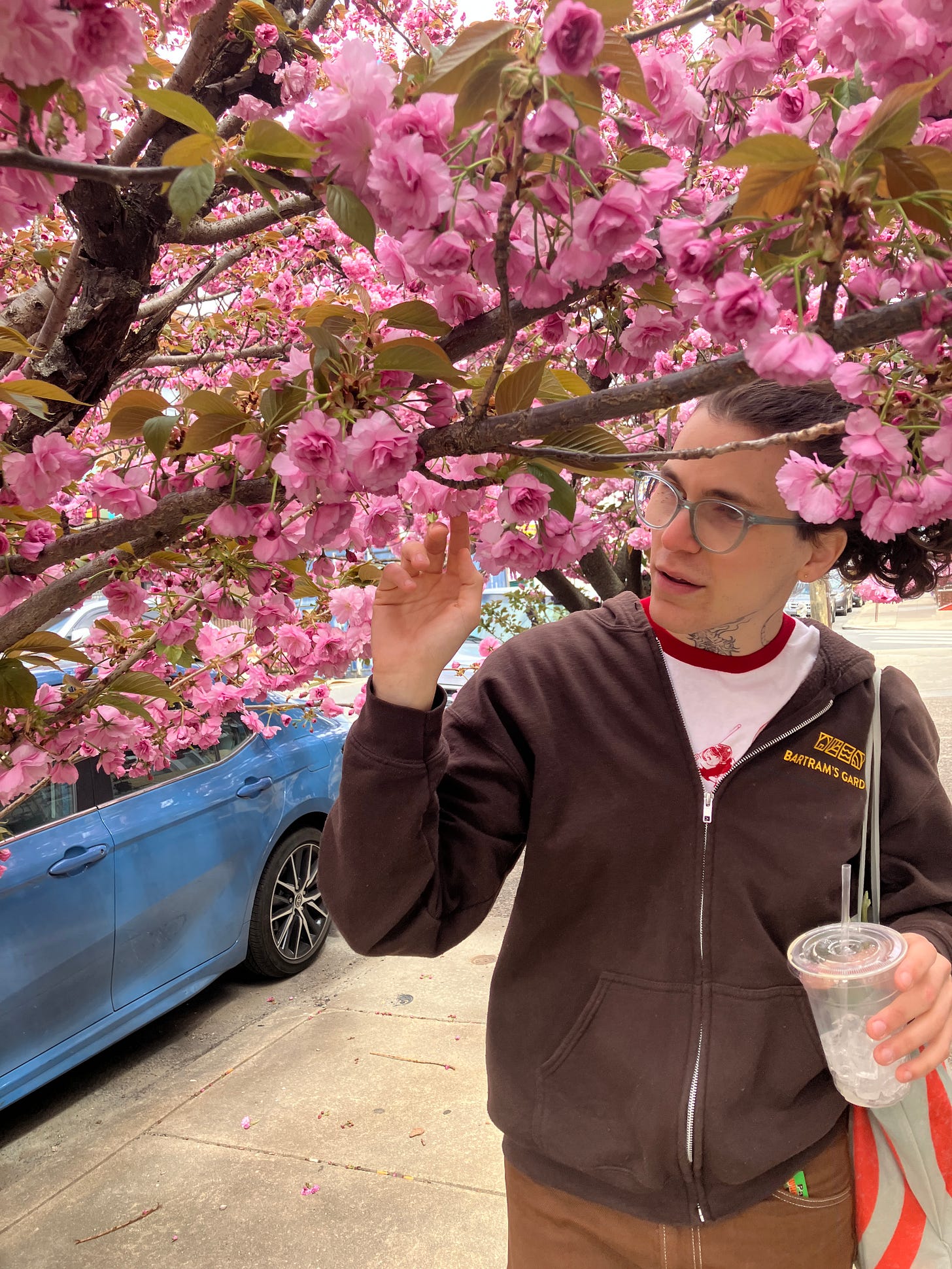Notes on April
Street trees, ChatGPT, M. Butterfly, mosaics, sea silk...
Hello friends <3 April has been a bit of a blur. I’m not on a grad school fellowship right now, so I’m working multiple part time jobs while trying to continue to make dissertation progress. Lots of 12 hour work days, fucked up sleep schedule, et cetera. Consequently, I spent a good portion of this month feeling bone-tired. However, I’m writing this right now outside my favorite Philly coffee shop (Shot Tower, for the record) smelling the blooming flowers on the street trees and it’s making me feel optimistic. Clover and our bestie/roommate Lola are on the road for ten days teaching mutual aid workshops, and while I of course miss them, I am also so happy and proud that they are out there doing valuable work that will materially support people’s ability to live and thrive. My goal for the next month is to slow down, accept my current reality re: work, find as many opportunities to enjoy life as possible, and tend to the projects that matter to me most. And also to party.
Also, I would like to reiterate my threat promise that when this newsletter reaches 2,000 subscribers (we’re gettin close!) I will be starting an audio advice column called Gay Little Problem where you will get to hear me discuss your gay little problems with my friends. So start brainstorming your problems, and please urge your 183 dearest friends, cousins, baristas, etc. to subscribe now.
Alright, lets get into some notes.
-This New Yorker essay by Grace Byron details the cruelty and chaos of the Trump administration’s policies on gender markers for trans peoples’ passports and other legal documents. Byron writes:
The attacks on transgender people are intimately tied to the current waves of deportations and the fall of Roe v. Wade, which are part of a larger crackdown on bodily autonomy. Rights are won, and then they are stripped away. For many trans people, this ambivalent dependence on the state is both a privilege and a weakness. We are tied to a political machine that ultimately does not want us. For years, we have been forced to work out creative solutions to bureaucratic snafus; we have celebrated hard-fought victories that often turn out to be short-lived. The state will not save us, we joke, even as we fear that it may very well try to extinguish us.
-I work part-time for as a tutor for an online writing center, and I have since my first semester of grad school. Historically, the writing center is fully booked up after, like, the second week of classes, and there’s a waiting list of people trying to get appointments. In the last year, bookings have dropped off significantly, which I found totally perplexing. In a meeting with the staff, the center’s director told us that the only explanation she could come up with for this was that more and more students are using generative AI to write their papers. As soon as she said this, I was like, “oh, duh.” I have an embarrassing tendency to forget that ChatGPT exists, which is something I will certainly need to work on if I am to have a career as an *educator.* Somewhat relatedly, a friend of mine started an admin/data job at a university and reported that she had to attend a seminar her first day on her department’s supposedly thoughtful approach to changes brought by AI, and the whole presentation was set to a slideshow of schlock AI generated images, lmaooo. Like, when they had a break to eat pizza, there was a slide with an AI generated image of fake people eating pizza. Diabolical.
Anyway, I read and appreciated a couple things I read on Substack this moth about generative AI and its impact on writing and higher ed. Rayne Fisher-Quann’s essay “Choosing to Walk” on the value of writing without AI assistance (even when it’s drudgery) was sweet, and I vibed with its conclusions. “I Don’t Care About AI” from
was perfectly caustic in its assessment of the impact of AI on academia and the knowledge production industry; Clare argues that “takes” on AI are actually obscuring our ability to see the much more significant forces eroding academia. I didn’t agree with every point in this essay, but I loved reading it. Clare writes:The thing killing the academy is a decades-too-long exploitation of free labor that’s shelling it out from the bottom. The entire thing runs on graduate students who do stuff for no money, which used to be a tax paid for tenure. But, the more people who (justifiably, deservedly) got tenure, the less jobs there were. And now, fancy universities want non-tenure track lecturers with PhDs and adjunct experience for 60k a year. Without graders of undergraduates and students of professors, professors don’t have anything to do, you see, that makes a university any money. Yet they still hold onto hope that they will become the next, contemporary Foucault. Outside, you can’t afford an apartment in any city in America and you’re told if you leave your house you’ll die. Inside, enrollment is down and undergrads don’t want to be there. Hallucinated citations and cheating on English tests are not of paramount importance in this milieu.

